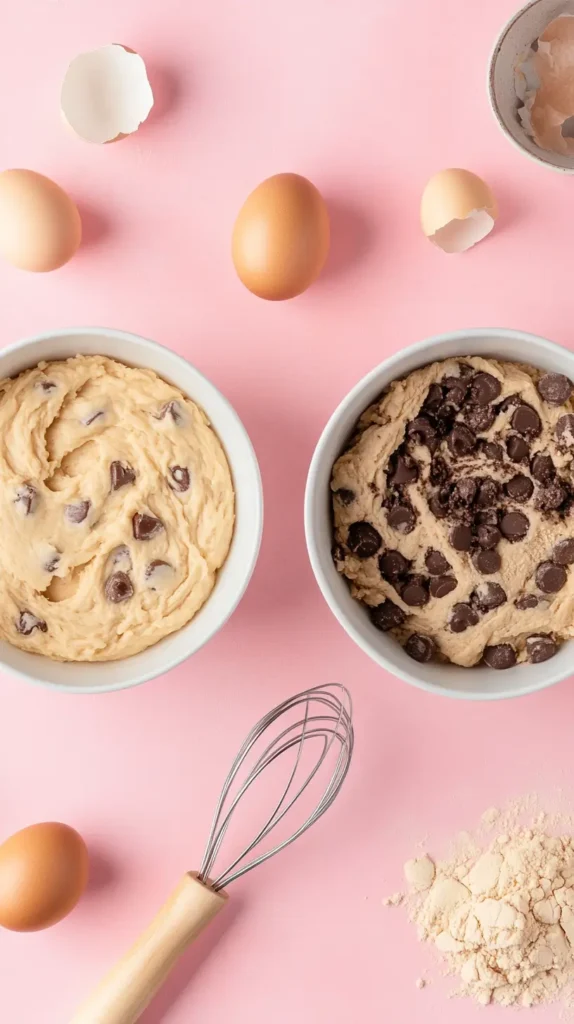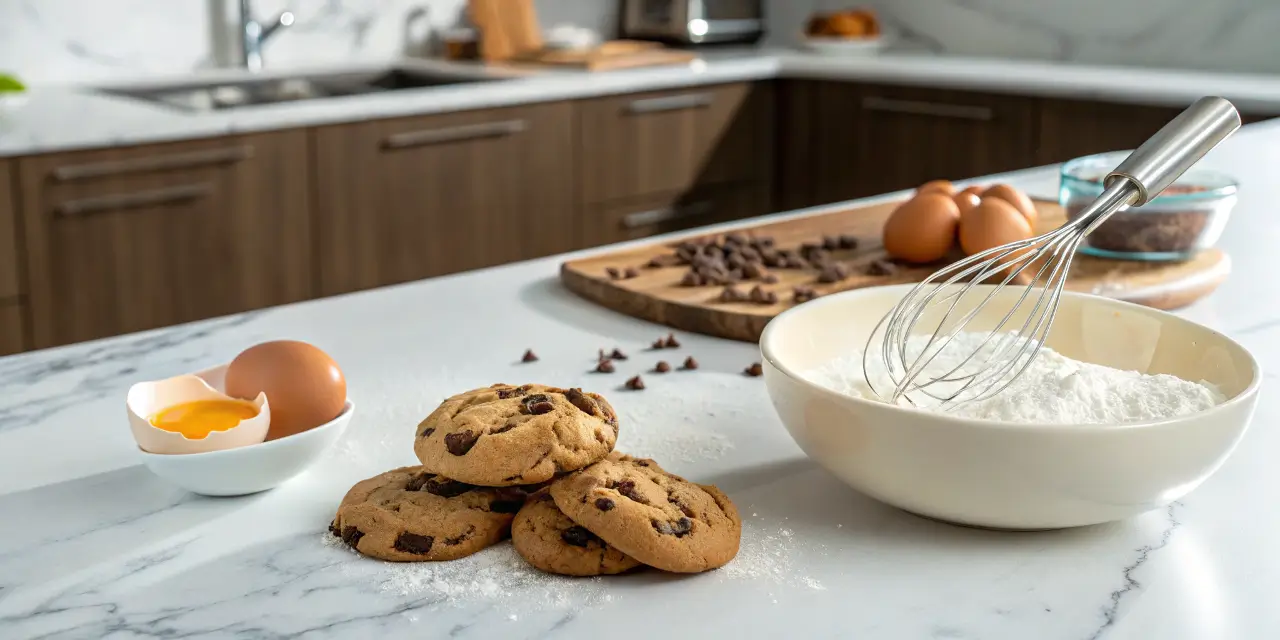Cookies are a timeless treat enjoyed worldwide, but their texture, flavor, and appearance can vary greatly depending on the ingredients used. Among these, eggs play a pivotal role in shaping the final product. But what does adding an extra egg do to cookies? This article delves into the science and effects of this subtle yet impactful change in cookie recipes.
Understanding the Role of Eggs in Baking
The Science Behind Eggs in Cookies
Eggs are the unsung heroes of baking. They contribute significantly to the structure, moisture, and binding properties of cookies. When combined with other ingredients, they create a cohesive dough that bakes into delicious treats. The unique composition of egg whites and yolks allows them to interact with sugars, fats, and flours in specific ways, determining the cookie’s texture and flavor.
Eggs act as emulsifiers, helping the fat and water components blend seamlessly. Without eggs, cookies may crumble or fail to hold their shape. Adding an extra egg, therefore, modifies this balance, offering variations in moisture content and structure.
Why Eggs Are a Crucial Ingredient
Eggs are crucial in baking because they serve multiple roles simultaneously. They provide structure through proteins, bind ingredients together, and add moisture and richness. Moreover, the heat during baking transforms egg proteins into a network that solidifies, creating a stable cookie shape.
- Eggs contribute to the dough’s elasticity, making it easier to handle.
- They prevent excessive crumbling by acting as a natural adhesive.
- Their rich, fatty yolks enhance the flavor profile of cookies.
When we ask what does adding an extra egg do to cookies, it’s essential to first understand how eggs bring both texture and taste together harmoniously.
Protein and Structure in Cookies
Egg proteins are vital for creating structure. When exposed to heat, the proteins denature and form a firm matrix that holds the cookie together. This ensures that cookies maintain their form, even when laden with chocolate chips or nuts.
An extra egg introduces more protein into the mix, which can make the cookies firmer or chewier, depending on how the dough is prepared. This subtle change in protein content affects both the height and density of the final cookie.
Moisture and Fat Content Contribution
Eggs are rich in water and fats, especially in the yolk. These components contribute significantly to a cookie’s moistness and overall texture. Adding an extra egg increases the water content, resulting in cookies that are softer and more pliable. Conversely, egg yolks, with their fat content, enhance richness and smoothness.
Effects of Adding an Extra Egg to Cookie Dough
Enhanced Moisture and Softness
Adding an extra egg can dramatically improve the moisture content of cookies. This adjustment often yields cookies that are tender and almost cake-like in texture. The additional egg allows the dough to retain more liquid, which prevents the cookies from becoming dry or brittle after baking.
Soft cookies with an extra egg:
- Tend to stay fresher for longer.
- Have a more pillowy bite.
- Are less prone to cracking on the surface.
Impact on Cookie Spread
Eggs influence how much a cookie spreads during baking. A standard recipe balances wet and dry ingredients to control spreading. Adding an extra egg introduces more liquid and binding agents, which can limit excessive spread. The result is often thicker cookies with a smaller diameter but greater height.
For those who love cookies with a soft center and defined edges, the addition of an extra egg is a simple yet effective solution.
Alterations in Cookie Flavor
Egg yolks are naturally rich in fats, which contribute to the overall flavor profile. Adding an extra egg enhances the buttery, rich notes of a cookie. While the change may seem minor, it creates a depth of flavor that becomes noticeable, especially in recipes with minimal spices or additional flavorings.
The Role of Yolks vs. Whites in Texture
The effects of adding an extra egg can vary depending on whether you include the yolk, the white, or both. Each component contributes differently to texture and appearance.
Yolks and Richness
Egg yolks are known for their fat content, which contributes to a velvety texture and decadent flavor. An extra yolk alone can make cookies:
- Chewier and richer in taste.
- Less prone to drying out after baking.
- Golden in hue due to the yolk’s natural color.
Whites and Crispness
Egg whites, on the other hand, are almost entirely protein and water. Adding an extra egg white can make cookies:
- Slightly crispier due to reduced fat content.
- Lighter in texture but firmer in structure.
- More cohesive during the baking process.
Comparing Cookies with Standard and Extra Egg
Visual and Textural Differences
When comparing cookies made with a standard recipe versus those with an extra egg, distinct visual and textural differences emerge. Cookies with an additional egg are generally puffier and have a glossy finish. Their interiors are softer, while their edges retain a delicate crispness.
Key contrasts:
- Standard cookies may spread more, appearing thinner and wider.
- Extra-egg cookies often have a more uniform and compact appearance.
Taste Profile Adjustments
Taste differences are subtle but noticeable. The enhanced fat content from an extra egg yolk amplifies the cookie’s flavor, making it richer and more indulgent. Simultaneously, the added moisture balances the sweetness, creating a well-rounded bite.
Key Takeaways for Bakers
Adding an extra egg to cookie dough may seem like a small change, but its effects are profound. It enhances texture, moisture, and flavor, making cookies softer, chewier, or richer, depending on your goals. Whether you prefer crisp edges or a tender interior, understanding what does adding an extra egg do to cookies allows you to experiment and tailor recipes to your taste.
- For softer cookies: Add one whole egg.
- For richer cookies: Add an extra yolk.
- For crispier cookies: Add an extra white.
By tweaking your recipe, you can discover a world of possibilities hidden within a simple egg.

When to Add an Extra Egg to Your Cookie Recipe
Adjustments for Different Cookie Types When Adding an Extra Egg
Different types of cookies call for different textures, and adding an extra egg can help achieve specific results. For example:
- Chewy cookies: Adding an extra egg is ideal for recipes like chocolate chip cookies or oatmeal cookies, as it enhances moisture and chewiness.
- Soft cookies: Recipes like sugar cookies or snickerdoodles benefit from the added moisture, resulting in a tender and pillowy texture.
- Dense cookies: Avoid adding an extra egg to shortbread or biscotti recipes, as these rely on a crumbly, drier texture.
When determining what does adding an extra egg do to cookies, consider the desired texture of the cookie type. Adjustments should complement the recipe’s core characteristics.
Factors to Consider: Flour, Sugar, and Butter Ratios
Eggs interact with other ingredients in the recipe, so balance is key when adding an extra egg. Flour, sugar, and butter ratios determine how the dough responds to additional moisture and fat. Keep these tips in mind:
- Flour: Increase flour slightly to prevent overly sticky dough.
- Sugar: High sugar content can enhance spreading, so an extra egg might help control spread.
- Butter: If using a high butter ratio, adding an extra egg yolk enhances richness without making the cookies too moist.
Avoiding Over-Moistening the Dough When Adding an Extra Egg
While eggs add moisture, too much liquid can result in dough that’s difficult to handle or cookies that don’t bake evenly. To prevent this:
- Add a single egg yolk instead of a whole egg to control moisture while maintaining richness.
- Monitor the dough’s consistency after incorporating the egg, ensuring it remains pliable but not sticky.
- Adjust dry ingredients like flour if the dough becomes overly wet.
Understanding what does adding an extra egg do to cookies involves finding the right balance, ensuring your adjustments improve the recipe rather than overpower it.
Common Mistakes When Adding Extra Eggs
Balancing Other Ingredients
Adding an extra egg alters the ratio of wet to dry ingredients. Failing to adjust the remaining components can lead to:
- Overly soft cookies: Excess moisture dilutes the dough’s structure.
- Flattened cookies: Without additional flour or leavening, cookies may spread too much during baking.
To maintain balance:
- Increase flour by one to two tablespoons for every extra egg added.
- Reduce other wet ingredients like milk or cream slightly.
Overmixing and Gluten Formation: A Common Mistake with Extra Eggs
When eggs are added, they must be mixed evenly. However, overmixing can activate gluten in the flour, resulting in tough cookies instead of soft or chewy ones. To avoid this:
- Mix eggs in at low speed until just incorporated.
- Use a spatula for the final mix if the dough feels overworked.
- Add eggs gradually to avoid overloading the dough with liquid all at once.
By understanding these pitfalls, you can better manage what does adding an extra egg do to cookies and avoid common mistakes that could compromise your bake.

Benefits of Experimenting with Egg Quantities
Customizing Texture for Personal Preference
One of the biggest benefits of tweaking egg quantities is the ability to tailor cookie textures to your liking. Adding an extra egg lets you:
- Create cookies with a soft, chewy interior and crispy edges.
- Achieve a more cake-like texture for thicker, fluffier cookies.
- Adjust moisture levels to suit specific dietary preferences or ingredient variations.
If you enjoy experimenting in the kitchen, testing what does adding an extra egg do to cookies allows for creative customization to match your ideal cookie style.
Creating Unique Cookie Recipes by Adding Extra Eggs
Customizing egg quantities also opens doors to unique cookie recipes. For example:
- Substitute a whole egg with two yolks for ultra-rich and dense cookies.
- Add only the white for a lighter, crisper result.
- Combine different egg ratios to create hybrid textures that are chewy yet firm.
The possibilities are endless, and exploring what does adding an extra egg do to cookies lets you craft recipes that stand out.
Comparing Cookies with Standard and Extra Egg
Using Room-Temperature Eggs
Room-temperature eggs mix more evenly with other ingredients, creating a smoother dough. Cold eggs can cause butter to seize, resulting in uneven texture. Before baking:
- Allow eggs to sit at room temperature for 30 minutes.
- Submerge cold eggs in warm water for 5 minutes for quicker results.
Using room-temperature eggs ensures consistency and maximizes the benefits of what does adding an extra egg do to cookies.
Beating Eggs Properly for Consistency
How you beat your eggs can affect the final dough. Properly beaten eggs create a uniform structure that improves texture and flavor. Tips for success:
- Whisk eggs lightly before adding to the dough for even distribution.
- Avoid overbeating, which can incorporate too much air, causing cookies to rise unevenly.
Timing Egg Addition in the Mixing Process for Perfect Cookies
The stage at which you add eggs to your cookie dough is critical. Add them after creaming butter and sugar to ensure proper emulsification. Delayed addition may result in a grainy texture.
Incorporating these tips enhances your understanding of what does adding an extra egg do to cookies, leading to consistent, high-quality results.
FAQs About Adding an Extra Egg to Cookies
What happens if you add an extra egg to cookies?
Adding an extra egg to cookies impacts their texture, moisture, and structure. The additional egg introduces more liquid and protein to the dough, which can result in cookies that are softer, chewier, and slightly thicker. The extra moisture from the egg helps the cookies retain their tenderness, preventing them from drying out. Furthermore, the added protein strengthens the dough, providing a firmer but still pliable structure. Depending on the recipe, this adjustment can create cookies with a cake-like consistency or enhance the chewiness without affecting flavor negatively.
What makes a cookie crunchy or chewy?
The texture of a cookie—whether it’s crunchy or chewy—depends on the ratio and interaction of ingredients:
- Crunchy cookies are achieved by reducing moisture content. Using more sugar (especially white sugar), butter, and egg whites contributes to a crisp texture. Longer baking times also help by evaporating more moisture.
- Chewy cookies require more moisture. Ingredients like brown sugar, extra egg yolks, or slightly less flour increase moisture and create a tender, chewy bite. Shorter baking times also preserve this softness.
The balance of fats, sugars, and baking methods ultimately determines whether a cookie is crunchy or chewy.
How does an extra egg affect baking?
An extra egg can alter the texture, structure, and moisture balance in baked goods. In cookies, an additional egg typically leads to a softer and moister product because of the added liquid and fats. The egg’s protein also contributes to a firmer, more cohesive dough, which can prevent cookies from spreading too much during baking. However, in cakes or bread, an extra egg may increase volume and create a fluffier texture. It’s essential to consider the recipe’s existing ratios, as too many eggs can make baked goods overly dense or wet.
What does adding an extra egg yolk do?
Adding an extra egg yolk enhances the richness, flavor, and tenderness of baked goods. Egg yolks are high in fat, which contributes to a creamier, softer texture and adds a decadent taste. In cookies, an additional yolk can make them chewier and denser without adding excess moisture. It also helps the dough hold its shape better, creating cookies that are thick and rich. For recipes requiring a luxurious or melt-in-your-mouth texture, incorporating an extra yolk is a simple yet effective modification.
Conclusion
Recap of the Effects of Adding an Extra Egg
Adding an extra egg to cookies influences moisture, texture, and flavor, allowing bakers to customize recipes to their liking. From softer interiors to richer flavors, understanding what does adding an extra egg do to cookies empowers bakers to achieve the perfect balance in every batch.
Encouragement to Experiment and Customize Cookie Recipes
Baking is as much about creativity as it is about precision. By experimenting with egg quantities, you can tailor cookie recipes to suit your preferences and explore unique textures and flavors. Start small, make adjustments thoughtfully, and enjoy the process of discovering your ideal cookie recipe.





